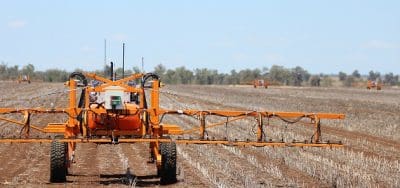SWARMFARM Robotics, the developer of lightweight, driverless robot farming machines, has taken the next step to commercialisation by joining in a new partnership with global technology and services provider, Bosch Australia.
The Central Queensland start-up will utilise the engineering and manufacturing expertise of Bosch to redesign its unique SwarmBot robotic platform for commercial production.
The aim will be to develop the final production model of the SwarmBot ahead of commercial sales to farmers in mid-2018.
SwarmFarm founder and CEO, Andrew Bate, said the new partnership with Bosch was a major milestone for the company following the official launch of its ground-breaking autonomous SwarmBot robots, which had been deployed in Australia since 2016.
“This new partnership will ensure that we can begin manufacture and delivery of our new robot design to early-adopter farmers in the new year. We’re proud to be developing this cutting-edge technology in partnership with Bosch,” Mr Bate said.
“The SwarmBot is not a driverless tractor, just as the tractor was not an evolution of the horse drawn plough. Horses were completely replaced. The next revolution in farming will not be underpinned by a tractor.
“SwarmFarm has developed the SwarmBot technology platform to deliver a paradigm shift in efficiency to farmers. This technology will enable farmers to undertake new field practices and deploy technology into their farming systems through the use of “swarms” of smart, mobile and automated robots.”
Mr Bate said the SwarmBot platform was an entirely new development that had evolved from the ground up.
“It utilises robotic technology and an ecosystem of independent developers that will create modular technology for application to the platform,” he said.
“Robotic agriculture will enable farmers to achieve consistency previously unattainable using traditional farming methods. This will increase yields and decrease inputs.”
Mr Bate said recent trends had seen farming equipment such as tractors, sprayers and planting equipment become increasingly larger and more complex.
“This trend is unsustainable due to the limitations of current farming practices. Traditional tractors and current generation driverless commercial technologies are confined by what can be attached to the back of the vehicles and the inputs they can carry,” he said.
…………………………
See earlier Grain Central stories:


HAVE YOUR SAY